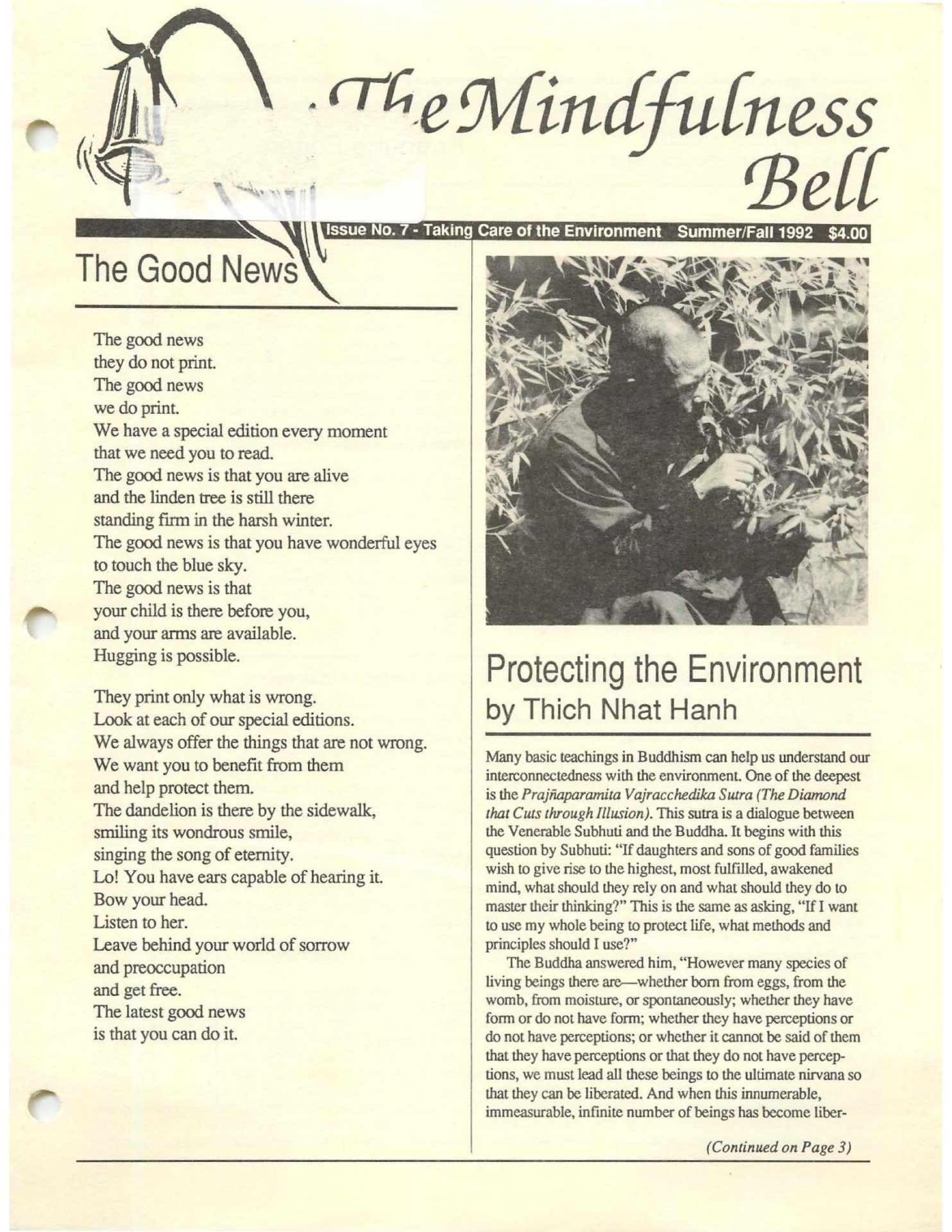By Stanley Young
During the Retreat for Environmentalists, a reporter from the Los Angeles Reader came to Camp Shalom and conducted this interview with Thay.
What is your message to environmental activists?
They must learn to take care of themselves. Activists need strength, especially spiritual strength. You can only share success or happiness when you have these things in yourself. So in order to take care of the environment,
By Stanley Young
During the Retreat for Environmentalists, a reporter from the Los Angeles Reader came to Camp Shalom and conducted this interview with Thay.
What is your message to environmental activists?
They must learn to take care of themselves. Activists need strength, especially spiritual strength. You can only share success or happiness when you have these things in yourself. So in order to take care of the environment, you have to take care of the environmentalist. Activists who want to protect the Earth have to learn to protect themselves. This retreat is an opportunity for them to have the time to look deeply. Those of us who are wounded in the process of serving need to learn the art of healing ourselves-and to learn it from each other.
Why is the environment in the shape we now find it?
We have followed our desires. We have exploited the Earth, and we have not been mindful of what we have been doing. According to my tradition, we "inter-are" with the Earth. We and the Earth are one, and hurting one is hurting the other. Forgetting one is forgetting the other. The best way to take care of the Earth is to take care of your daily life.
We need education, not just by writing articles or preaching sermons, but educating by our own way of living. If the Earth is to be saved, it will be saved by our example, the way we drink, the way we eat, the way we consume. We can do it as individuals, but we must also do it as a community, a sangha, so that it will have a greater effect.
But doesn't environmental activism also mean fighting corporations in court, or opposing loggers who want to clear-cut?
If you do these things as a means of educating people, then they are helpful. That is, you do these things not to oppose someone out of your hatred, but as a means to show what damage is being done to the environment. But if you think that you are fighting an enemy—the businessmen, the politicians, whoever may be the exploiters of the resources of the Earth—that attitude becomes a problem, because it can only promote hatred and division.
We have to understand the suffering of oppressed peoples, but that does not mean we have the right to annihilate the oppressors. Those who exploit and damage the Earth also suffer, so we have to take actions that will help these people realize they are doing harm. They can learn from us.
What do we do with our anger?
Our task is to effectuate change. The peaceful way is nondualistic, not taking something or someone as an enemy. It is to try to transform the whole situation, including yourself. Hatred and anger are energies, but they are more destructive than helpful. The only kind of energy that can be constructive is compassion. When you are motivated by hatred, you are blind. When you are motivated by compassion, loving kindness, you can see.
Doesn't compassion soften our actions?
Compassion leads to the strongest kind of action. Compassion goes together with understanding, because in my tradition love is the fruit of understanding. When you are motivated by love, you are able to do whatever is needed to reduce suffering and bring happiness. You can die, yet you don't suffer, because your strength is compassion and understanding.
In Vietnam during the war, some Buddhist monks burned themselves. That was a very courageous act, but many people didn't understand. They thought it was an act of protest, but it was not. We were caught between the two warring parties, and we did not want to take sides. We only wanted to make our aspiration known, which was not to have a victory for anyone, but the survival of our people. We didn't have access to the same means as the warring parties—so we offered our bodies as a means of communication. If you don't have a deep understanding of the suffering of people, if you don't have strong compassion, you cannot take such an action. Please don't think that out of compassion you cannot have strong action. It is the opposite.
Reprinted with permission from the Los Angeles Reader, Friday, April 12, 1991, Volume 13, Number 26.

